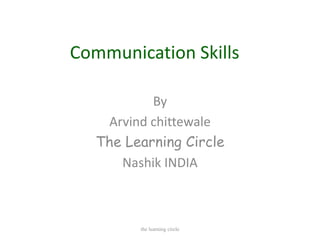
Communicating Messages Media
- 1. Communication Skills By Arvind chittewale The Learning Circle Nashik INDIA the learning circle
- 2. Communication how to talk so people can listen how to listen so people can talk the learning circle
- 3. Communication Planning what is the objective of the communication? Who are the target audience? What is the message? How will it reach them? the learning circle
- 4. Communication: A simple looking complex process Said is Sustained the learning circle
- 5. Communication: stages easier said than done! Said is not Heard Heard is not Understood Understood is not Accepted Accepted is not Implemented (done) Implemented is not Maintained Maintained is not Sustained the learning circle
- 6. Seek to understand before you seek to be understood Communication is not just what you say but how you say it the learning circle
- 7. Listening to people will help us to communicate Said will be Heard Heard will be Understood Understood will be Accepted Accepted will be Implemented (done) Implemented will be Maintained Maintained will be Sustained the learning circle
- 9. Messages Sender Receiver reach SENSES gain ATTENTION message UNDERSTOOD acceptance CHANGE create enabling environment for CHANGE in BEHAIOUR the learning circle
- 10. 3 Stages of understanding • Magical Understanding • Naive understanding • Critical understanding the learning circle
- 11. Communication: Common pitfalls • Preaching the converted. • Untimely dissemination • Abstract messages • Visual literacy the learning circle
- 12. Visual literacy • A picture is worth hundred words! Not always • Visuals are universally understood ? Check it up? People learn to read pictures as they learn to read words the learning circle
- 13. What do you see the learning circle
- 14. • Atleast 8 Indian national leaders in the tree ! the learning circle
- 15. Targeting 3 important things Identify • positive practices and use them to initiate dialogue • neutral practices and learn to ignore them • harmful practices and target them the learning circle
- 16. Some skills Positive practices • catch them doing something right Neutral practices • learn intelligent ignorance Harmful practices • confront it - target it - attack!! ! the learning circle
- 17. Adults learn more when • the message contents are relevant to them • they understand and comprehend the message • the messages are presented in a functional way Hearing - Seeing - Doing the learning circle
- 18. Key principles of Paulo Friere 1 No developmental education is neutral ~ Our thrust is on maintaining existing system or ~ On liberating people help them to become critical, free, active and responsible members of society the learning circle
- 19. Key principles Friere 2 Issues of Importance ~ People act on issues on which they have strong feelings ~ Close link between Emotion & Motivation identify issues on which people speak with excitement,hope, fear and anger the learning circle
- 20. Key principles Friere 3 Problem Posing Approach opposite to Banking Approach ~ Identify problems and find root causes ~ Provides Frame work for thinking Raises questions - why? How?.. Participants are active - describing, analyzing, suggesting, deciding and planning the learning circle
- 21. Questions for ourselves • Do we trust the capability of people? • Aren't we educated in the dominant class? • Are we working for the poor or with the poor? • Are we drawing out from their strengths? • Are we listening to what is said and what is not said? • How well do we know the people? the learning circle
- 22. Media Classification MEDIA TRADITIONAL MODERN Audio Songs, story, poetry audio cassettes, radio A -V Theater, puppetry, TV, cinema, slide – dance, drama shows, Visual Crafts, masks, mime Pictures, leaflets Paintings, flannel, new papers, slides the learning circle
- 23. Mass Media • Can be used to entertain, educate, and even manipulate • Can increase awareness,information,motivation • Can influence attitude • Can increase the demand for services but….. the learning circle
- 24. But Mass media • Can not bring about a change in behaviour easily unless there is a change in system and programme • Can not be equally effective in all matters • Can not stimulate the audience to really think and get organized( for good cause) the learning circle
- 25. Group Media • low cost • adaptable • can address a specific group/ specific need • use local language • provide space for discussion and dialogue • horizontal communication • immediate feed back the learning circle
- 26. Some Tips for Effective Communication • As far as possible give concrete messages. • From what is known to unknown • From what is good to what can be improved • One message at a time ( single message strategy) • small sentences the learning circle
- 27. Some more tips • Use conversational language • Watch your words ( vocabulary of illiterates/neo literate people is less) • Technical words (jargons) - explain • Remember Visuals are not universally understood • Field test media material the learning circle
- 28. Media is the starting point: Facilitation is a must 1 What did you see? …… ( awareness) 2 Why did it happen?……. ( analysis ) 3 Does it happen in our village?..( awareness) 4 What do you think are the root causes? (analysis) 5 What can we do about it? ( action) the learning circle
- 29. To Conclude • Reach them- Research viewing& reading habits ( observe and listen) • Attract them- Make it interesting/ attractive/ novel ( stand out) • Ensure understanding- K.I.S.S. • Increase Acceptability- Use credible sources • Support behaviour change - Enabling envt.( influential people/feedback/services) the learning circle
- 30. Arvind chittewale The Learning Circle 27 Bhavanjali Nagar Gangapur Road NASHIK-13 INDIA M 0982307556 T 0253 234129 E : arvindlearningcircle@gmail.com the learning circle
